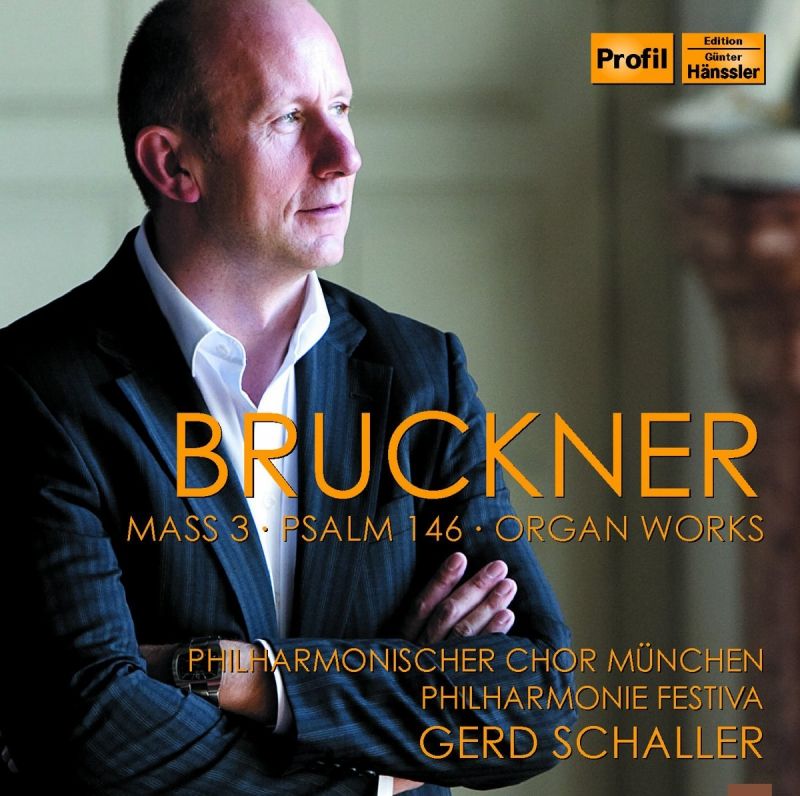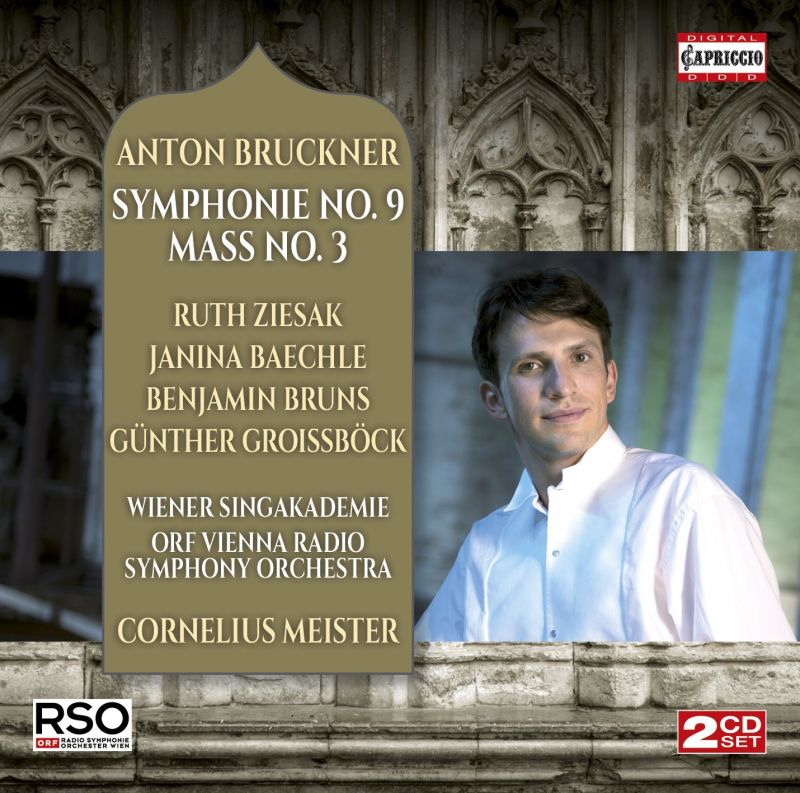BRUCKNER Mass No 3
View record and artist detailsRecord and Artist Details
Composer or Director: Anton Bruckner
Genre:
Vocal
Label: Profil
Magazine Review Date: 09/2016
Media Format: CD or Download
Media Runtime: 117
Mastering:
DDD
Catalogue Number: PH16034

Tracks:
| Composition | Artist Credit |
|---|---|
| Mass No. 3 |
Anton Bruckner, Composer
Ania Vegry, Soprano Anton Bruckner, Composer Clemens Bieber, Tenor Franziska Gottwald, Contralto Gerd Schaller, Director, Organ Munich Philharmonic Choir Philharmonie Festiva Timo Riihonen, Bass |
| Psalm 146 |
Anton Bruckner, Composer
Ania Vegry, Soprano Anton Bruckner, Composer Clemens Bieber, Tenor Franziska Gottwald, Contralto Gerd Schaller, Director, Organ Munich Philharmonic Choir Philharmonie Festiva Timo Riihonen, Bass |
| Improvisation Sketches, ‘Bad Ischl’ |
Anton Bruckner, Composer
Anton Bruckner, Composer Gerd Schaller, Organ |
| Andante |
Anton Bruckner, Composer
Anton Bruckner, Composer Gerd Schaller, Organ |
| Postlude |
Anton Bruckner, Composer
Anton Bruckner, Composer Gerd Schaller, Organ |
| Prelude and Fugue |
Anton Bruckner, Composer
Anton Bruckner, Composer Gerd Schaller, Organ |
| Fugue |
Anton Bruckner, Composer
Anton Bruckner, Composer Gerd Schaller, Organ |
| ‘Perger’ Prelude |
Anton Bruckner, Composer
Anton Bruckner, Composer |
Composer or Director: Anton Bruckner
Genre:
Vocal
Label: Capriccio
Magazine Review Date: 09/2016
Media Format: CD or Download
Media Runtime: 124
Mastering:
DDD
Catalogue Number: C5247

Tracks:
| Composition | Artist Credit |
|---|---|
| Symphony No. 9 |
Anton Bruckner, Composer
Anton Bruckner, Composer Cornelius Meister, Conductor Vienna Radio Symphony Orchestra |
| Mass No. 3 |
Anton Bruckner, Composer
Anton Bruckner, Composer Benjamin Bruns, Tenor Cornelius Meister, Conductor Günther Groissböck, Bass Janina Baechle, Contralto Ruth Ziesak, Soprano Vienna Radio Symphony Orchestra |
Author: Christian Hoskins
Bruckner’s reputation as a composer rests almost exclusively on the series of mature works that followed the completion of his studies with Otto Kitzler in 1863 at the age of 39. However, a considerable number of works exist from before this time, including Psalm 146, a 30 minute piece for soloists, double choir and orchestra that dates from no later than 1858. It’s a markedly lyrical work with recognisable Brucknerian fingerprints and, as Peter Quantrill observed in his Specialist’s Guide on Alleluias (3/16), a concluding fugue of remarkable invention and sophistication. Schaller’s richly articulate performance is the first recording since Wolfgang Riedelbauch’s pioneering account of 1972 (available from klassichaus.us) and is a valuable contribution to the Bruckner discography. Further rarities are provided in the form of five short organ pieces composed between 1843 and 1884, comprising almost the entirety of Bruckner’s output for an instrument on which his performing skill was legendary. Although Bruckner’s famous improvisations are lost to posterity, Schaller also includes an arrangement by the organist Erwin Horn of a three-page sketch Bruckner made for a performance in 1890. Based largely on the finale of the First Symphony, the sketch provides an idea of how one of Bruckner’s organ improvisations might have sounded. Schaller’s performances of these pieces, using the main organ of the Ebrach Monastery, are expertly delivered.
If not quite on the same level as Schaller’s performance, Cornelius Meister’s account of the Mass No 3 is well prepared and imaginatively paced. With dynamic markings scrupulously observed and disciplined choral singing, the work’s quieter passages sound especially luminous. However, these benefits are negated by a recording that becomes congested in louder passages, blunting the impact of much of the Gloria and Credo. In addition, Meister’s soloists, as fine as they are, do not communicate the same commitment as their counterparts on the Profil recording. Meister’s coupling is a performance of Symphony No 9 in its traditional form without the finale. Somewhat better recorded than the Mass, the performance is warmly expressive and spontaneous, although not especially heaven-storming.
Both sets have booklet-notes in English, although no translations of the texts are provided, which is disappointing in the case of the rarely heard Psalm 146. Despite this omission, the Profil set is an essential release for anyone interested in Bruckner’s music.
Discover the world's largest classical music catalogue with Presto Music.

Gramophone Digital Club
- Digital Edition
- Digital Archive
- Reviews Database
- Full website access
From £8.75 / month
Subscribe
Gramophone Full Club
- Print Edition
- Digital Edition
- Digital Archive
- Reviews Database
- Full website access
From £11.00 / month
Subscribe
If you are a library, university or other organisation that would be interested in an institutional subscription to Gramophone please click here for further information.




